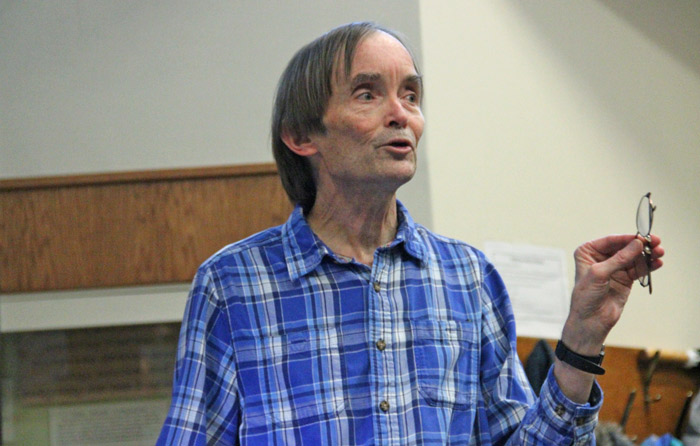McGill Physics Professor Robert Brandenberger spoke at the Cutting Edge lecture series on Jan. 12 hosted by the Redpath Museum.
In the lecture, Brandenberger shed light on the question, “What was before the Big Bang and how might we be able to tell?”
“Who thinks that there was a Big Bang?” Brandenburger asked the crowd, which was almost full of raised hands. “Who knows what the Big Bang was?”
Many of the crowd’s hands were lowered in response to his second question.
“There are a number of you who think there was a Big Bang, but you don’t know what the Big Bang was. This is a slight problem,” Brandenburger said. “I want you […] to walk out of this room this evening knowing what physicists mean when they say there was a Big Bang, […] but also you should walk out from this room knowing that the title of this topic makes sense.”
According to Brandenberger, the paradigms of universe cosmology have shifted over time. The standard Big Bang cosmology, created around 1960, was eventually replaced with the current inflationary universe scenario theorized in the 1980s.
Standard Big Bang cosmology was based on Einstein’s equations for classical matter, in which he assumed that the Universe was finite, although his equations suggested that the universe was expanding.
“Einstein made a small mistake because he did not know about the expansion of space,” Brandenberger explained. “He realized that [his equations] gave rise to this idea that space expands, but he stuck in a fudge term, such that space would not expand.”
Edwin Hubble, and other famous astronomers and astrophysicists, saw that there was a need for a new theory to explain expanding space, thus, the inflationary universe scenario was created. The inflationary universe scenario accommodates for the expansion of the universe and uses scalar terms. It utilizes scalar terms to account for the fact that the laws that govern classical matter break down at extremely high temperatures.
Brandenberger explained that standard Big Bang cosmology also includes the very hot, homogeneous fireball typically associated with the Big Bang. But, because classical physics breaks down at extreme temperatures, a new cosmological theory was developed to accommodate these conditions. The inflationary model of cosmology solves this problem because quantum mechanics and particle physics offer suitable descriptions of matter at these extremely hot temperatures.
Both the standard Big Bang theory and the inflationary universe theory assume that time began with the Big Bang, but new research suggests this might not be the case. According to Brandenberger, the old and current paradigm both provide valuable information on the Big Bang, but both make predictions, which lead to more questions.
“In both Paradigms one and two there was a ‘Big Bang’ singularity,” Brandenberger said.
A Big Bang singularity is the concept the Big Bang was the beginning of time, but it is hard to provide proof that this event triggered the start of time.
“We need a new paradigm and this new paradigm could come from string gas cosmology,” Brandenberger said.
Brandenberger suggested that string gas cosmology could be a possible third paradigm that answers the question of what came before the Big Bang. String gas cosmology is based on superstring theory, which is a quantum theory that tries to unify all forces of nature. In other words, the laws that govern the forces of nature would be simplified into basic equations.
“If by Big Bang you mean a hot fireball of finite size at some early time, string gas cosmology has this hot fireball,” Brandenberger said. “But, […] there is no singularity, there is no beginning of time. So, in this sense, it makes sense to say there was something before the Big Bang.”
While string theory is still in development, it offers a new paradigm to answer questions on a cosmological scale. Though extremely complex, Brandenberger succeeded in his initial goal as the audience walked out of the room with the knowledge that there could be something before the Big Bang.










The Big Bang is so 20th Century. Quantum Cosmology is the next big thing. One word young man. Axions.
http://lifeform.net/archimedes/Quantum_Cosmology.pdf
Just what we need. Another particle…
You darned scientists!
Cheers!